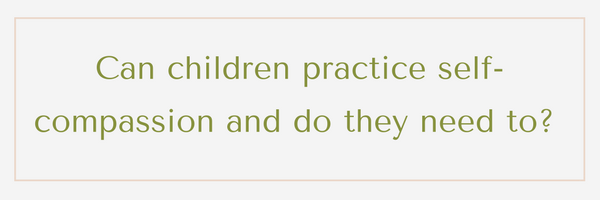Yes and yes!
Self-compassion is a wellness practice of being kind to oneself when emotions such as pain, suffering and general feelings of ‘not enough-ness’ emerge within us. Clearly, we all have had moments in our lives where we are unkind, critical, and even cruel to ourselves. We might speak in a tone or with words that we would never use towards our loved ones or friends. Self-compassion researchers Kristen Neff describes self-compassion as having three elements 1) Self-kindness vs. Self-judgment 2) Common humanity vs. Isolation 3. Mindfulness vs. Over-identification. The practice of self-compassion is certainly something we can take on at any age. Yet, how young can we start to cultivate this way of relating to ourselves? Can children understand self-compassion?
The language we use in our homes, the way that we treat ourselves, and certainly the habits we help our children create have immediate and long-lasting value for our children. In my home, I set out to practice self-compassion with my children and in front of them. Although every child is different, introducing and practicing self-compassion can happen in small moments.
I was confident that my seven-year-old daughter, Gracie would grasp the concepts and be able to personalize her practice with example and discussion rather quickly. With my Oliver, my five-year-old boy, I was worried that he wouldn’t get it. I chose to set up our practices different.
First, I used a 1:1 moment so that I could really attend to what my child was saying and doing. Second, I took their natural attentional limits into consideration.
For my daughter, a table top conversation would be enough. Allowing her to eat a lunch during the discussion only allowed her to feel comfortable. I use big words like “self-kindness” and “common humanity” with her. She feels listened to and she trusts herself to offer opinions, even when the material is new. I am careful not to correct; yet I gently guide our conversation towards a place of understanding. I’m not perfect in this discussion and perhaps I could have done it different, but it's ‘good enough’ and that is what is important.
For my little one, first I used scaffolding rather than explanation and just gave him a self-compassion mantra to repeat. I created a very positive experience prior where I chose something that was challenging, yet kept him feeling emotionally regulated throughout.
With my son, his shame messages can come quickly with an edge of self-criticism that can make my heart hurt. I decided that if he were really feeling shame, pain, or suffering it would be hard for him to take in my words and feel the value in self-compassion.
You can see his face is light and bright when he repeats my words. I don’t ask for him to explain to me that he gets it, I just allow him to try on these big words. He repeats “I am a good enough boy,” “I try hard things” and “I am my own best friend.” Then he gives himself a little hug, showing himself love and affection. He bounces throughout and I don’t stop him. I let him be who he is and I let him take what he can from this practice. Most surprisingly, Oliver has started to refer to himself as ‘my own best friend,’ even playfully asking for more desert for his best friend. He got it. He’s being kind in his humorous five-year-old little way.
For our family, this is just our start. We’ve invited our practice into moments where hurt and self-doubt were ruling a moment. We’ve had fun with being our own best friends such as drawing self-portraits. We routinely pause to hold our own hearts and show ourselves affection. Both kids, as young as they are, feel a little silly doing this. This just encourages their mama a little more. Most importantly, and perhaps most difficult, I’ve made a habit in my own life.

